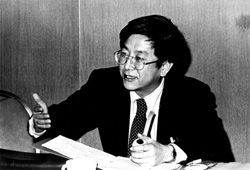Benjamin Lee Comments on HEP Discoveries

Benjamin Lee
Benjamin Lee as head of Fermilab's Theoretical Physics Department, is frequently asked what the new discoveries in high energy physics mean, where is the field headed, what is going to happen next? Dr. Lee comments on these matters in the following remarks prepared for a seminar for science writers at the recent meeting of the American Physical Society:
There is an exhilaration in the air wherever particle physics is discussed these days, excitement about the rapid progress that has taken place in the last few years. On the theoretical side, we have glimpsed the unity of all forces that act among particles; we have constructed a theoretical framework in which to unify three forces in nature -- the so-called electromagnetic and weak forces, and perhaps even the strong force which is responsible for binding quarks to form hadrons (the strongly interacting particles which include the proton, neutron, pi mesons and strange particles). The unified understanding of these forces in nature demands that there be at least one more quark -- the "charmed" quark -- and perhaps other quarks and even heavier forms of electrons and muons, of the family of weakly interacting particles we call leptons.
If there is a charmed quark, there ought to be "charmed" hadrons made up of charmed quarks and ordinary quarks. On the experimental side, there have been a number of indications that we might already have seen such particles. It is likely that we have discovered charmed particles and a heavy lepton, although profusion of the new events clouds our vision at the moment.
When I explain to my family and friends what I do and how we go about it, I often liken the process of physics research to solving a jigsaw puzzle (Jackson Pollock's "Convergence," for example). As we put together pieces to form patches, a certain image of the overall picture emerges, but until the game is sufficiently progressed, we are not quite sure. I feel much the same way about the wealth of signs for new particles. We have patches that have been put together, but we are not quite sure how all pieces will fit together into a coherent whole. There are also certain pieces which do not seem to fit into any patches at all. For the most part, the experimental findings have not been completely unexpected, but there have been certain surprises that I, for one, had not foreseen. This is what makes particle physics exciting and tantalizing. At moments of despair and frustration, I feel as though somebody has scrambled two boxes of jigsaw puzzles for me to put together. But I believe in what Einstein once said: "God is subtle but He is not malicious."
Aside from the new particles we have spoken of so far, there are several new objects we must discover. Can quarks be liberated from the confines of a hadron? Prevailing theoretical prejudice says otherwise, but nobody is absolutely certain of this. We know that the electromagnetic force and the quantum of light (photon) are two aspects of the same mathematical construct, called quantum electrodynamics. It has long been speculated that there are quanta, or particles, which bear the same relationship to the weak force as the photon does to the electromagnetic force. Furthermore, these particles, called intermediate vector bosons, are required in any unified description of fundamental forces. Currently popular theories predict the masses of these particles to be very large, so large that even the most powerful of existing accelerators cannot produce them.
These observations do not exhaust all the possibilities as we see them now, but they indicate the range of exciting opportunities that may be expected. More exciting still is the certain knowledge that nature's possibilities are not limited by our imagination. We must remember that the knowledge and arts we gain today are our legacy to posterity. This is what civilization is all about. Individual names may soon be forgotten, but the aspiration and achievements of an age, and of a nation, will forever be remembered.


